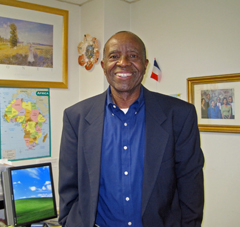Dept. of French, Francophone, and Italian Studies


Some people spend their whole lives in search of their true passion. Luckily for Dr. Godwin Uwah, it's almost as if his passion sought him out first.
Uwah grew up in southeastern Nigeria where he missed studying Latin in high school because the government at the time had discontinued the program for its unappealing status as a dead language. Uwah finished school without Latin and felt incomplete.
"Not having a language to learn created a vacuum in me," Uwah said. "It was a yearning I had to fill, so I grabbed French in college and ran with it."
And as they say, he never looked back.
Thousands of miles away from home, Uwah settled in Charleston in 1983 after getting his master's degree in French from Winthrop University and his Ph.D. in contemporary French literature from Florida State University.
However far away, Uwah always carried with him the inspiration he got from his professors back home. "My passion from teaching came from those excellent teachers I had in Nigeria," Uwah said with a nostalgic tone. "The interest they had in their teaching was contagious and transferred to me."
A hard worker with a positive attitude, Uwah holds numerous positions at the College of Charleston. He is chair of the French, Francophone and Italian Studies department, the director of languages for the language and international business program, the faculty liaison for the School of Business and the School of Languages, Cultures and World Affairs, the adviser of international business students with a language option, and also the adviser of the International Business Club.
"Dr. Uwah is one of the nicest guys I know," said Norbert Sclippa, one of Uwah's colleagues in the French, Francophone and Italian studies department. "He's always ready to do his best and help whenever he can."
Uwah's academic research has been in many different fields, including: contemporary issues (politics, social and cultural issues), Francophone African Women in literature, the theme of disillusionment in African literature, woman and choice in African literature (ongoing research), existential dimension in Calixthe Beyala's novels (ongoing research), African-born immigrants in the U.S. and the story of alienation, and the paradox of acceptance and misgivings among African born-immigrants in U.S. Higher Education.
Despite his eclectic interest, Uwah still considers the philosophy of existentialism to be at the core of his writing and research. This philosophy, which underlines the idea that "existence precedes essence," inspired the works of playwright Samuel Beckett and French author Albert Camus, whom Uwah says is his hero.
"What fascinates me the most about existentialism is the centrality of choice," Uwah said. "People must live up to their actions because they practice free will."
Although a religious man, Uwah still accepts these ideas because he believes, "We have the capacity of creating our own essence, which could supercede or override the existing essence we have." To him, the idea of becoming rather than just being is an important underpinning of choices we make.
Even with his busy schedule, Uwah sets aside time to pursue his current research that focuses on women in African literature. An ongoing project of his, Uwah aspires to write a manuscript positioning that, contrary to common stereotypes, the traditional African woman has choice in her culture. He also hopes to write an article exploring the existential dimension in the works of Calixthe Beyala, a prolific female writer from Cameroon.
When Uwah is not in the classroom or doing research, he spends time relaxing in his home with his wife. His four children are grown and out of the house. He enjoys reading, writing, and watching French television (TV-5 Monde). He says he also enjoys discussing world issues, and "injustice of world order with like-minded individuals- those who can disagree with me with decency."
For Uwah, being able to share his knowledge with his students is the most fulfilling part of teaching. He says, "Teaching provides me with a vehicle to share whatever knowledge I have and maybe change the behavior of some students, even if it's only a few."
Judging by comments from his former students, Uwah seems to have achieved what he intended to do- make an impact in his student's lives.
According to one of Uwah's former students on ratemyprofessors.com, "Godwin Uwah always has a smile on his face and encourages his students to participate and to do well. I am not very talented at foreign language, especially not French, but this professor was patient and really helped me better comprehend the language."
Uwah brings his passion of existentialism into the classroom by challenging his students to make their own choices. He encourages his students to become rather than be and to take responsibility for their own actions.
So, here's a word of advice for students with an existentialist professor: don't even think about getting away with the dog eating your homework excuse.
###